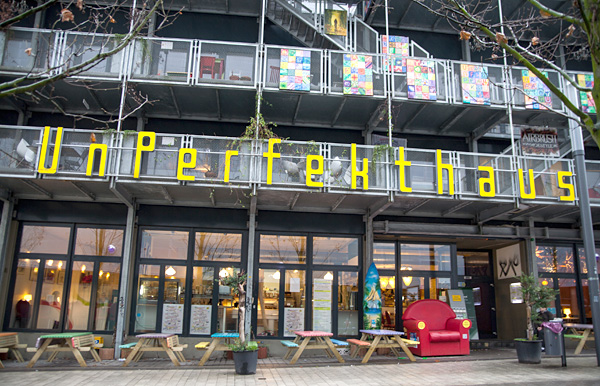Germany’s Unperfekthaus: Is this the Library of the Future?

Photo by HDValentin (www.flickr.com/photos/vbachem).
Improving perceptions about the need for school libraries can be an uphill journey, though many of us attempt it daily. Perceptions are hard to change. Might I suggest a new approach? Consider the value of your square footage. You can make a positive impact by radically changing your library space—right now. A re-conceived facility in Germany recently showed me what the future library could be.
Let’s be honest. Physical resources are in decline, and the pace of transition to digital holdings will likely only accelerate. Nothing against the book. This is simply an adjustment to a more effective and efficient technology for transmitting, storing, and retrieving information. It’s also aligned to the goals of the Common Core State Standards in both its shift toward more literary nonfiction print holdings, and its preparation of students for future experiences that will be highly digitized.
Now: What can we do with all that library space opened up by the decline of print? In the past, it would have accommodated desktops and laptops, but with the increase in tablet adoption, we need new ideas.
My recommendation? Implement a solution before anyone notices. Future-proof your library’s square footage—and step up as proactive manager of that resource.
I discovered the great potential of what a library space could be on a recent trip to Essen, Germany, where the international board game fair, SPIEL, was being held. One event took place in a former monastery building now called the Unperfekthaus—translation, “Imperfect house”—in downtown Essen. This amazing venue, founded by German entrepreneur Reinhard Wiesermann in 2004, is a creative community resource that’s constantly evolving.
Various things are housed inside the seven-story building. There are event spaces, meeting rooms, an artist village, a restaurant, and more. The spaces are open, so visitors can explore artist studios, attend informal classes, and roam around, discovering and interacting with the Unperfekthaus community. Rooms, from small conference areas with full tech support to a large auditorium, can be rented for various events. The price of admission, including unlimited beverages and a buffet—very tasty—is reasonable: A whole day costs €10.50 (about $14.20); five hours is €6.50 (roughly $8.80).
Germany’s Ruhr River valley, where Essen is located, is an ideal incubator for this kind of visionary thinking. Historically, this region was a center of industry focused on metals and coal. Today it has reinvented itself as a high-tech, green hub of urban development.
Even though the Unperfekthaus is for profit and schools and libraries likely wouldn’t charge admission, we can still learn a great deal from this model. The experiment resembles American maker spaces—but addresses even more diverse forms of art and learning. What if the school library had an art studio—or your local public library featured a performance stage for individuals and groups seeking an audience?
The secret sauce for this dynamic gathering spot is the founding premise that it would be imperfect. Accepting that things will go wrong is freeing: You can explore, fail, adapt, and keep trying until things work. Your library could provide a platform for crazy new ideas like an un-club event, during which students could engage with hobbies that don’t rise to the level of an official club—and engage with one another, as well.
Such spatial transformation doesn’t necessarily require much financial investment and could yield huge gains for your community. Go forth, freed from the quest for perfection, and try playing with your space. If you fail, try again.
RELATED
The job outlook in 2030: Librarians will be in demand
The job outlook in 2030: Librarians will be in demand
ALREADY A SUBSCRIBER? LOG IN
We are currently offering this content for free. Sign up now to activate your personal profile, where you can save articles for future viewing





Add Comment :-
Be the first reader to comment.
Comment Policy:
Comment should not be empty !!!